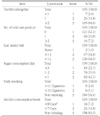Abstract
Objectives
This study aimed to determine the oral health behaviors and the relationships between social support, self-esteem, and oral health behaviors.
Methods
The institutions were selected based on the “2016 Elderly Welfare Facilities Status.” A total of 195 people participated in interviews conducted using a 39-item questionnaire. It included information on the following topics: a) sociodemographic and health-related characteristics (11 items), b) oral health behaviors (6), c) social support (12), and d) self-esteem (10). Statistical analyses included descriptive statistics, a reliability test, a t-test, an ANOVA, a Pearson's correlation test, and a stepwise multiple regression, conducted using the SPSS 23.0 program.
Results
Of the 195 participants, 165 (84.6%) brushed their teeth twice a day; however only 74 (38.0%) participants used oral care products. Although many (64.6%) elderly people visited a dentist at least once a year, only a few (24.6%) visited the dentist for preventive purposes. Oral health behaviors had a positive correlation with self-esteem, significant others' support, and friends'support (.337, .270, and .254, respectively; P<.01). According to the multiple regression analysis, self-esteem, significant others' support, perceived health status, number of existing permanent teeth, friends' support, degree of exercise, gender, and average monthly expenditure had a significant effect on the participants' oral health behaviors.
Figures and Tables
Table 1
Composition of oral health behaviors scale and distribution by item

*≥8 Cups: Excessive drinking, ≤7 Cups: Moderate drinking15).
Table 2
Oral health behaviors, social support and self-esteem according to sociodemographic characteristics

Table 3
Oral health behaviors, social support and self-esteem according to health-related characteristics

References
1. Korea Centers for Disease Control and Prevention. Korea Health Statistics 2014: Korea National Health and Nutrition Examination Survey (KNHANES VI-2). Cheongju: Korea Centers for Disease Control and Prevention;2015. p. 126p. 265–275.
2. World Health Organization. The Bangkok Charter for Health Promotion in a Globalized World. Health Promot Int. 2006; 21:Suppl 1. 10–14.
3. Oh YB, Lee HS, Kim SN. Children's dental health behavior in relation to their mothers socioeconomic factors and dental health beliefs. J Korean Acad Oral Health. 1994; 18:62–83.
4. Pender NJ, Walker SN, Sechrist KR, Frank-Stromborg M. Predicting health-promoting lifestyles in the workplace. Nurs Res. 1990; 39:326–332.

5. Oh HJ, Kim DH. Research on the influential factors in senior citizens' health promotion behaviors. Health Soc Sci. 2012; 32:173–197.
6. Kim TM, Lee SG, Jeon SY. The relations of social support to the health behaviors and health status in the elderly. Korean J Health Educ Promot. 2006; 23:99–119.
8. Park YJ, Lee SJ, Park ES, Chang SO. A prediction model for health promoting behavior of the Korean elderly. J Korean Acad Nurs. 1999; 29:281–292.

9. Song YM, Lee SJ, Ko MS. The mediational effects of self-esteem and social support on relationship between alone-living elder's isolation and quality of life. J Soc Welf Dev. 2010; 16:369–391.
10. Rosenberg M. Society and the adolescent self-image. New Jersey: Prinston University Press;1965. p. 30.
11. Song AR. The relationship analysis of health locus of control, self-esteem and self-care behavior[master's thesis]. Seoul: Ewha Woman's University;1984. [Korean].
12. Watt RG. Strategies and approaches in oral disease prevention and health promotion. Bull World Health Organ. 2005; 83:711–718.
13. Ministry of Health & Welfare. 2016 Elderly Welfare Facilities Status. Sejong: Ministry of Health & Welfare;2015. p. 10. p. 102. p. 362.
14. Kim JY, Kim YS, Lee HJ, Hong JS, Chang KW. Factors influencing oral discomfort in elderly people. J Korean Acad Oral Health. 2016; 40:49–54.

15. Korea Institute for Health and Social Affairs. 2014 Korea National Elderly Survey. Sejong: Korea Institute for Health and Social Affairs;2014. p. 311. p. 323. p. 325.
16. World Health Organization. Oral health surveys: basic methods. 5th ed. Geneva: World Health Organization;2013. p. 111–114.
17. Chang KW, Kim JB. Basic methods of oral health surveys recommended by World Health Organization. 5th ed. Seoul: Komoonsa;2016. p. 118–121.
18. Zimet GD, Dahlem NW, Zimet SG, Farley GK. The multidimensional scale of perceived social support. J Pers Assess. 1988; 52:30–41.

19. Shin JS, Lee YB. The effects of social supports on psychosocial well-being of the unemployed. Korean J Soc Welf. 1999; 37:241–269.
20. Jeon BJ. Self-esteem: A test of its measurability. Yonsei Nonchong. 1974; 11:107–130.
21. Moon JE, Lee EJ. Relation to use of oral hygiene devices in the adults. J Korean Soc Dent Hyg. 2016; 16:427–434.

22. Ministry of Health & Welfare. 2015 Community integrated health promotion program guidance[Oral health]. Sejong: Ministry of Health & Welfare;2015. p. 21. p. 41.
23. Lee SE. A comparative study of effects of social support on dental service utilization of the elderly between urban and rural areas. Korean Public Health Res. 2014; 40:57–67.
24. Macgregor ID, Regis D, Balding J. Self-concept and dental health behaviours in adolscents. J Clin Periodontol. 1997; 24:335–339.
25. Kim MA, Kim HC. Self esteem and toothbrushing behavior in college students. J Korean Public Health Nurs. 2000; 14:1–11.
26. Petersen PE, Kwan S. Equity, social determinants and public health programmes-the case of oral health. Community Dent Oral Epidemiol. 2011; 39:481–487.

27. Seo GS. Health behavior in the aged and related variables. J Korea Gerontol Soc. 2008; 28:1201–1212.




 PDF
PDF ePub
ePub Citation
Citation Print
Print




 XML Download
XML Download